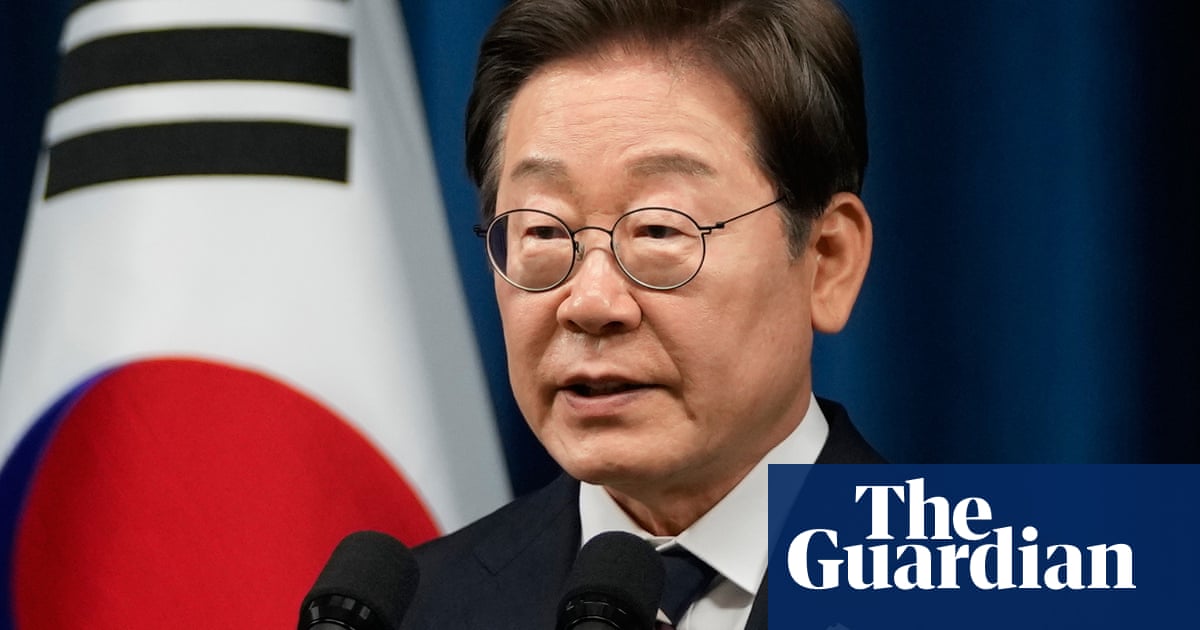Two years ago, the then South Korean president, Yoon Suk Yeol,serenaded Joe Bidenin the White House with a rendition of American Pie. The foundations of Washington’s ties with Seoul, one of its most important allies in the Asia-Pacific, appeared as firm as Yoon’s more-than-passable crooning.
As he prepares to replace thenow-disgraced Yoon, South Korea’s new leader,Lee Jae-myung, will have to strike a very different note with Biden’s successor in the White House.
His modest inauguration complete, Lee will focus initially on healing the open wound his predecessor inflicted on South Korean society and kick-starting growth in Asia’s fourth biggest economy.
Inevitably, though, he will soon have to find a way to engage with Donald Trump’s White House, whose initial reaction to Lee’s resounding victory over his conservative opponent was to suggest that his bumpy path to power had been smoothed by Chinese interference in the vote.
Not surprisingly, Lee devoted a good chunk of his first speech as president to Trump’s trade war, describing rising protectionism as “a threat to our very survival”.
There are no immediate plans, though, to request talks over the imposition, from Wednesday, of50% tariffson imports of steel and aluminium.South Koreawas the fourth largest exporter of steel to the US last year, accounting for 13% of its total steel imports.
“President Lee will find himself with little to no time to spare before tackling the most important task of his early presidency: reaching a deal with Trump,” the Washington-based Center for Strategic and International Studies said in an analysis.
There was little detail, too, on how Lee intends to repair economic ties with China – by far South Korea’s biggest trading partner – without alienating Trump.
Restoring public confidence in post-Yoon democracy aside, other huge challenges await Lee, according to Kim Jun-seok, a political science professor at Dongguk University in Seoul. “A grim outlook on the economy that’s projected to grow maybe less than 1%. And there’s a crisis outside, dealing with Trump. He has a lot of work to do.”
The biggest foreign policy challenge facing incoming South Korean presidents has traditionally centred on nuclear-armedNorth Korea. On Wednesday, Lee vowed to restart dialogue with the North after three years of rapidly deteriorating ties under Yoon.
“No matter how costly, peace is better than war,” he said, promising to “deter North Korean nuclear and military provocations while opening communication channels”.
Even though Trump recently repeated a demand made during his first presidency that Seoul pay more towards the cost of hosting 28,500 US troops in South Korea, bilateral security ties appear to be on solid ground – for now.
“The US and South Korea share an ironclad commitment to the alliance grounded in our mutual defence treaty, shared values, and deep economic ties,” the US secretary of state, Marco Rubio, said after Lee’s victory.
How much room for manoeuvre Lee has in reaching out to both China and the US remains to be seen. So far, he has made a point of lauding the US-South Korea relationship and says he intends to bolster a trilateral partnership with Washington and Tokyo.
After his brief inauguration at the national assembly, Lee made the customary telephone call to the head of his joint chiefs of staff, before honouring South Korean war dead at the national cemetery in Seoul. He was expected to take calls from world leaders later in the day, with Trump first to offer his congratulations.
“Political leadership is crucial at times like this,” said Kim Dae-jong, a professor at Sejong University in Seoul. “And with an elected president, a phone call with Trump could improve the situation significantly.”
Lee’s supporters describe him as a pragmatic and effective negotiator, but if he can bring himself to follow the lead of his predecessor, he could do worse than heed the message of another Don McLean hit from the early 1970s: If We Try.
